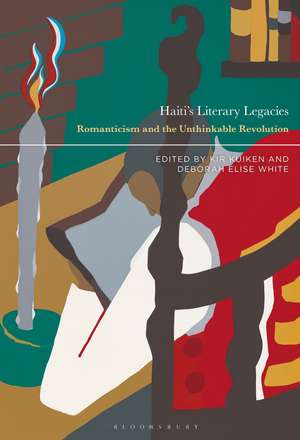Haiti’s Literary Legacies: Romanticism and the Unthinkable Revolution
Editat de Prof Kir Kuiken, Prof Deborah Elise Whiteen Limba Engleză Paperback – 28 iun 2023
| Toate formatele și edițiile | Preț | Express |
|---|---|---|
| Paperback (1) | 190.75 lei 43-57 zile | |
| Bloomsbury Publishing – 28 iun 2023 | 190.75 lei 43-57 zile | |
| Hardback (1) | 568.32 lei 43-57 zile | |
| Bloomsbury Publishing – dec 2021 | 568.32 lei 43-57 zile |
Preț: 190.75 lei
Nou
Puncte Express: 286
Preț estimativ în valută:
36.50€ • 37.89$ • 30.44£
36.50€ • 37.89$ • 30.44£
Carte tipărită la comandă
Livrare economică 24 martie-07 aprilie
Preluare comenzi: 021 569.72.76
Specificații
ISBN-13: 9781501376047
ISBN-10: 1501376047
Pagini: 226
Dimensiuni: 152 x 229 x 25 mm
Greutate: 0.31 kg
Editura: Bloomsbury Publishing
Colecția Bloomsbury Academic
Locul publicării:New York, United States
ISBN-10: 1501376047
Pagini: 226
Dimensiuni: 152 x 229 x 25 mm
Greutate: 0.31 kg
Editura: Bloomsbury Publishing
Colecția Bloomsbury Academic
Locul publicării:New York, United States
Caracteristici
Fills a gap in Romanticism scholarship by analyzing the effects of the Haitian revolution, which has been treated, at times, as an afterthought compared to the French revolution
Notă biografică
Kir Kuiken is Associate Professor of English at the University at Albany, SUNY, USA, and the author of Imagined Sovereignties: Towards a New Political Romanticism (2014) as well as essays on Kleist, Wordsworth, Derrida, Rancière and others.Deborah Elise White is Associate Professor of English and Comparative Literature at Emory University, USA, and the author of Romantic Returns: Superstition, Imagination, History (2000) as well as essays on Coleridge, Derrida, Freud, Hugo, and Marx.
Cuprins
AcknowledgmentsIntroductionKir Kuiken (SUNY Albany, USA) and Deborah Elise White (Emory University, USA)1. The Shadow of Voltaire: Early Haitian Literature and the Claims of IntertextualityChris Bongie (Queen's University at Kingston Ontario, Canada)2. Romantic Fevers: Calenture and Calenda in the AmericasMary Grace Albanese (SUNY Binghamton, USA)3. Toussaint Louverture: Creating a Public Romantic SubjectTheresa M. Kelley (University of Wisconsin at Madison, USA)4. Seeing into the Very Bones: C. L. R. James and William Wordsworth on Figure, Personhood, and Revolutionary DiscourseBrian McGrath (Clemson University, USA)5. Unavowed Community in Kleist's Betrothal in San DomingoKir Kuiken (SUNY Albany, USA)6. "Despair Begins with Stupefaction": Unthinkable Agencies in Hugo's Bug-JargalDeborah Elise White (Emory University, USA)7. Revolutionary Resonances in Frances Watkins Harper's "Triumph of Freedom"Brigitte Fielder (University of Wisconsin at Madison, USA)8. Revolutionary Shattering: Emerson on the Haitian RevolutionBranka Arsic (Columbia University, USA) Notes on ContributorsIndex
Recenzii
This pioneering volume traces compellingly how the Haitian Revolution left a profound mark on transatlantic Romanticism, which transcended genres, disciplines, languages, and races. It forms a ground-breaking contribution both to Romantic and Haitian Revolutionary Studies.
It is hard to imagine an historical event that more complexly or forcefully announces that Black lives matter than the Haitian Revolution, born amid the depravities of the most profitable plantation economy in the Caribbean. The events of 1791-1804 augured an unprecedented intervention in the modern world: a society for which an unqualified and universal right to freedom was not a theoretical abstraction but a political and moral practice. This volume, brimming with elegantly written and deeply researched scholarship, traces the layered transnational literary afterlives of the slave insurrection in Saint-Domingue, an insurrection that did much more than smash the slave system. As the scholars gathered here amply demonstrate, the revolution in Haiti has never ceased calling for the transformation of the very idea of revolution, as it does Romantic and Enlightenment conceptions of personhood, liberality, freedom, and literature. Haiti's Literary Legacies responds to that summons with uncommon rigor and imagination, reading the still unfolding aftermaths of Romanticism and Haiti through each other. This compelling volume leaves us with a wonderfully generative problem: what the 21st century makes of the Haitian Revolution will depend largely on what the Haitian Revolution makes of us.
At a time when the Haitian Revolution is being taught in history and literature classrooms more than ever before, this volume on the relationship of these world-historical events to literary romanticism could not be more timely. The volume's transnational scope and focus on writerly engagements with Haiti throughout the 19th century provides much-needed breadth and will ensure its enduring appeal.
It is hard to imagine an historical event that more complexly or forcefully announces that Black lives matter than the Haitian Revolution, born amid the depravities of the most profitable plantation economy in the Caribbean. The events of 1791-1804 augured an unprecedented intervention in the modern world: a society for which an unqualified and universal right to freedom was not a theoretical abstraction but a political and moral practice. This volume, brimming with elegantly written and deeply researched scholarship, traces the layered transnational literary afterlives of the slave insurrection in Saint-Domingue, an insurrection that did much more than smash the slave system. As the scholars gathered here amply demonstrate, the revolution in Haiti has never ceased calling for the transformation of the very idea of revolution, as it does Romantic and Enlightenment conceptions of personhood, liberality, freedom, and literature. Haiti's Literary Legacies responds to that summons with uncommon rigor and imagination, reading the still unfolding aftermaths of Romanticism and Haiti through each other. This compelling volume leaves us with a wonderfully generative problem: what the 21st century makes of the Haitian Revolution will depend largely on what the Haitian Revolution makes of us.
At a time when the Haitian Revolution is being taught in history and literature classrooms more than ever before, this volume on the relationship of these world-historical events to literary romanticism could not be more timely. The volume's transnational scope and focus on writerly engagements with Haiti throughout the 19th century provides much-needed breadth and will ensure its enduring appeal.
